I Grew Up in Appalachia Too. J.D. Vance Is a Hillb
Post# of 129015
COAL CITY CONFIDENTIAL
A 27-year-old Ivy League graduate from Coal City, West Virginia, explains what Trump’s running mate got wrong in his bestselling book.
Caleb Miller
Updated Jul. 18, 2024 7:09PM EDT Published Jul. 18, 2024 5:32PM EDT

Photo Illustration by Erin O’Flynn/The Daily Beast/Getty Images and Courtesy of Author
I was raised in Coal City, West Virginia and when Monday’s big news about Trump’s vice presidential selection was announced, I felt instant rage. I wrote to my friends:
“J.D. Vance was named Trump’s running mate, which means people are talking about his stupid fucking book again, in which a venture capitalist from suburban Ohio who spent a couple of summers in Kentucky praises himself for pulling himself up by his bootstraps and blames the continued poverty of his ‘fellow’ hillbillies on their poor choices.
“Instead, read literally anything else. Read Appalachian Reckoning which responds to J.D. Vance’s stupid fucking book. Read Demon Copperhead. Read Another Appalachia. Dump a can of alphabet soup onto the floor and read whatever comes out of that. I guarantee it will be better than J.D. Vance's stupid fucking book.”
Vance fills me with rage, in part, because I’m a lot like him.
When viewed from a distance, the arc of my life looks remarkably similar to his. Unlike Vance, my story actually starts in Appalachia. I was born in 1997, one town over from Coal City which doesn’t have luxuries like hospitals. My parents were white but that was basically their only advantage. My father is chronically ill and disabled. After getting a hysterectomy, and on the advice of her doctors, my mother started taking OxyContin. This prescription turned into an addiction that would carry her to an early grave.
Like Vance, I was raised primarily by my hillbilly grandparents, especially my mamaw. Papaw had died years earlier from stomach cancer that was left untreated when he refused to go to the doctor because he couldn’t afford to miss a shift in the mines. Papaw left mamaw with a meager pension and a roof over her head.
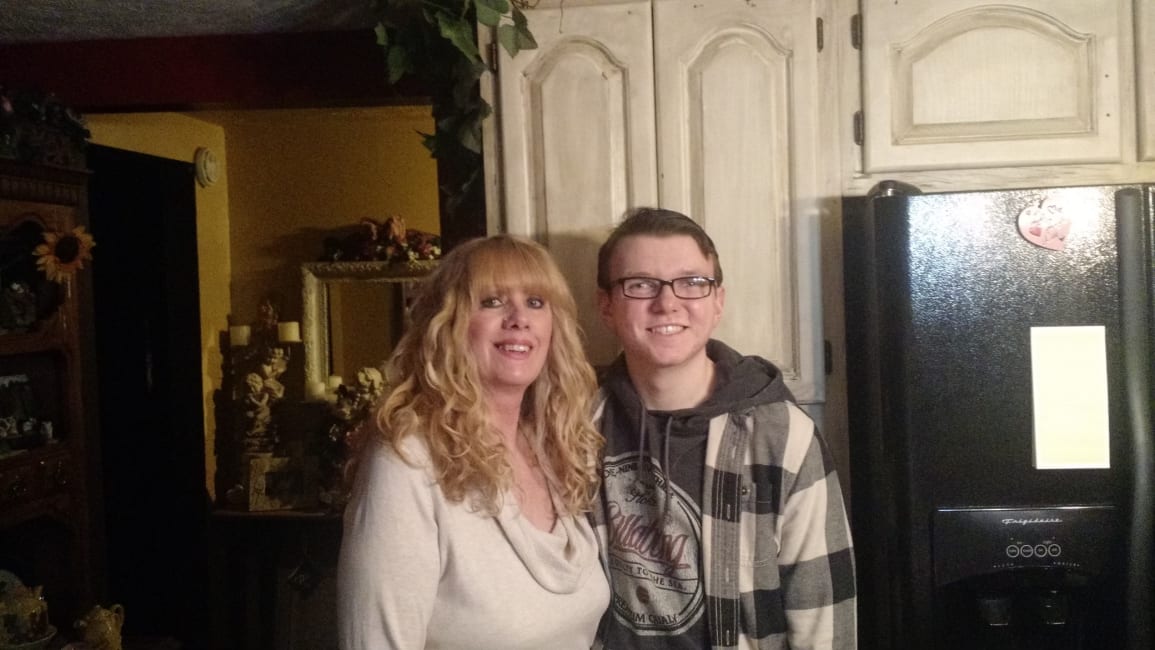
Caleb with his mamaw Sharon Miller.
We got by, but barely. We’d eat cornbread and grow vegetables in the garden. When I asked my grandma to buy me a computer, she hemmed and hawed before eventually agreeing. It wasn’t until we were at Walmart that she told me she was selling all of her jewelry—a lifetime’s worth of treasure for a coal miner’s wife—to be able to afford it. I tried to talk her out of the purchase, but she wouldn’t listen. She taught me that life is about doing what you can to help others, and she was practicing what she preached.
My public high school had many wonderful teachers and I gravitated toward one who noticed that I had an affinity for math. One day, Mr. Perkins asked us to write about what our lives would look like 10 years in the future. I wrote something like “In an ideal world, future Caleb will have graduated from Harvard and gone on to medical school, but OBVIOUSLY that’s never going to happen.”
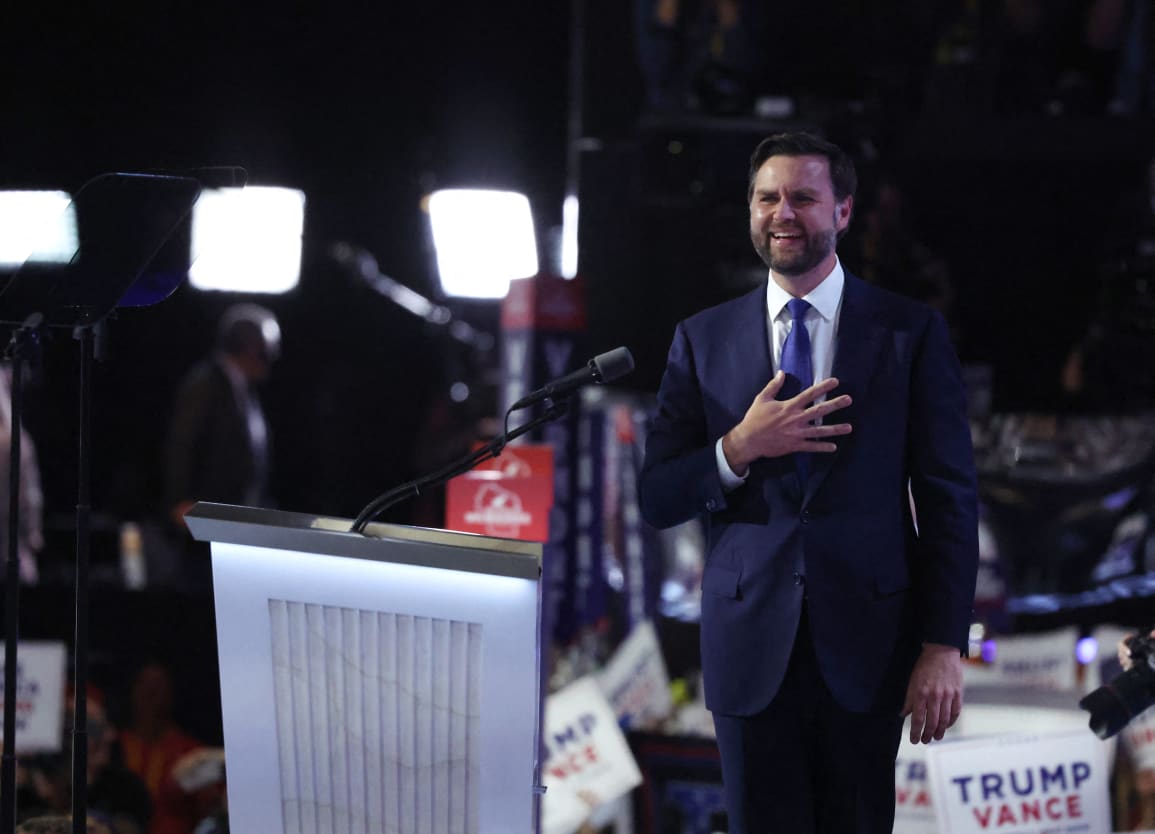
J.D. Vance on stage, hand on heart, smiling
Vance outlined his life story at the RNC but it filled me with rage, writes Caleb Miller, for its stunningly wrong conclusions.
When he handed back my paper, he circled the last sentence and wrote simply “Why not?”
That was the first moment that I believed a miracle like that could be possible. I started bootlegging textbooks off the library’s internet and watching educational videos on YouTube. I connected with a younger student who (somehow) loved math even more than I did, and together we were the founding (and only) members of the Independence High School recreational math club. I became a Presidential Scholar representing West Virginia and in the spring of my senior year, I was accepted to Harvard.
I was the first student from my high school to get into any Ivy League college in over 20 years and the local newspaper called to interview me. The one good thing about being really poor was I qualified for full financial aid. The next year, my math club co-founder was accepted to MIT and another friend from our high school also headed to Harvard. It’s easy to conceive of this as me blazing a path, but the truth is that we all pushed each other to work harder. Moving to Massachusetts—or “Liberal-land” as my family called it—was a shock (understatement of the century). College was incredibly difficult, especially compared to a West Virginia public high school. Over time, I adjusted. I even graduated from the math department with high honors.
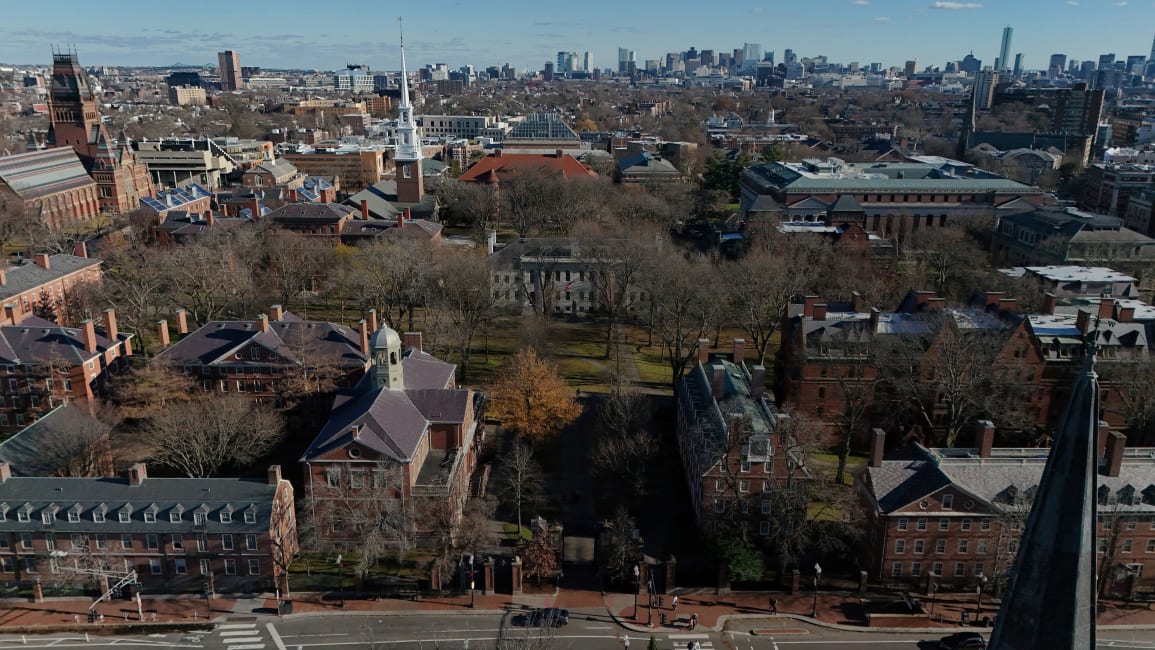
Aerial view of Harvard
Harvard could not have been a greater contrast to life in Coaltown, but Miller eventually thrived among its yards and atmosphere of privilege.
At Harvard, there is intense pressure on students to pursue the most “prestigious” goals. For math graduates who don’t want to be professors, getting a high-paying finance job is about the most “prestigious” thing that you can do. And the sort of salaries they offer to fresh college grads would be enough to bump my family up by a couple of tax brackets, so that’s what I resolved to do. I got an offer to become a trader at a high-end quantitative finance firm. They said they would pay me $150,000 a year (before bonuses!) to write computer code. In the moment, I couldn’t have been happier. I’d done it. I’d achieved Vance’s notion of the American Dream. I had pulled myself up by my own bootstraps.
But the problem with Vance’s conception of the American Dream is that it is just a dream. A fiction. A convincing lie that successful people tell themselves in order to claim all the credit for their accomplishments. I believed this lie for a while. It helped me to deal with survivor’s guilt, or whatever one should call the feelings that come with moving away from Coal City. But it’s important to recognize that taking all the credit discounts the influence that our communities, the government, and sheer dumb luck have on our outcomes.
I never would have applied to Harvard without the constant encouragement and support of Mr. Perkins.
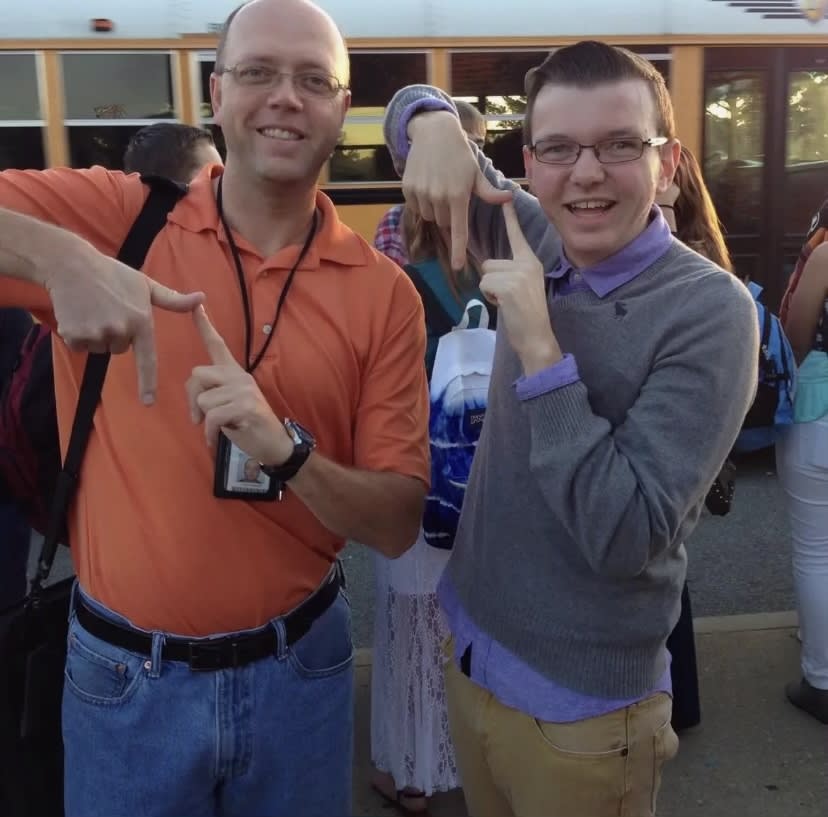
Caleb and Mr Chad Perkins do the sign for pi.
It took the dedication and ambition of Chad Perkins, a high school math teacher, to transform life for Miller.
I never would have gotten into Harvard if my alumni interviewer hadn’t pleaded with the admissions committee to seriously consider me. I never would have visited Harvard if not for a generous mentor offering to pay for flights for me and my grandmother. I never would’ve survived Harvard if not for the love and support from my friends and found family. It’s not that these “elites” taught me how to use a fork (like Vance claimed he learned only after entering the military), it’s that these nice people laughed at my jokes and made me feel like I belonged.
It’s at my post-college job in finance that my story and Vance’s started to diverge. I worked at a high-frequency trading firm where mere nanoseconds separated winners from losers. I got along well with my coworkers, but our collective goal was to take a giant pile of money, push it around, and hope that the pile of money grew by the end of the day. So while some of the minutiae was interesting, the mission was not.
My grandmother raised me better than that. She’s a devoutly religious woman and I grew up going to church with her. Mamaw was a Pentecostal, which meant that people were speaking in tongues and practicing divine healing. My favorite part was always watching Brother Monroe (everyone always called each other Brother and Sister, and treated each other as such) as he ran laps around the chapel during praise and worship, keeping time by banging his tambourine.
After the singing was done, the preacher would head to the pulpit and start his sermon. These were long and boring to an impatient child, but I did learn a few things. I learned that, apparently, it was easier for a camel to pass through the eye of a needle than for a rich man to enter the Kingdom of God. I also learned how Jesus sacrificed himself so that others might live. The god of the Old Testament gets a lot of well-deserved criticism, but Jesus seems like good people, to borrow a phrase from back home. I’m not religious (although I have been known to pray before math tests), but I recognize the valuable moral truths in these stories. I couldn’t justify staying at a job in which I found neither meaning nor joy.
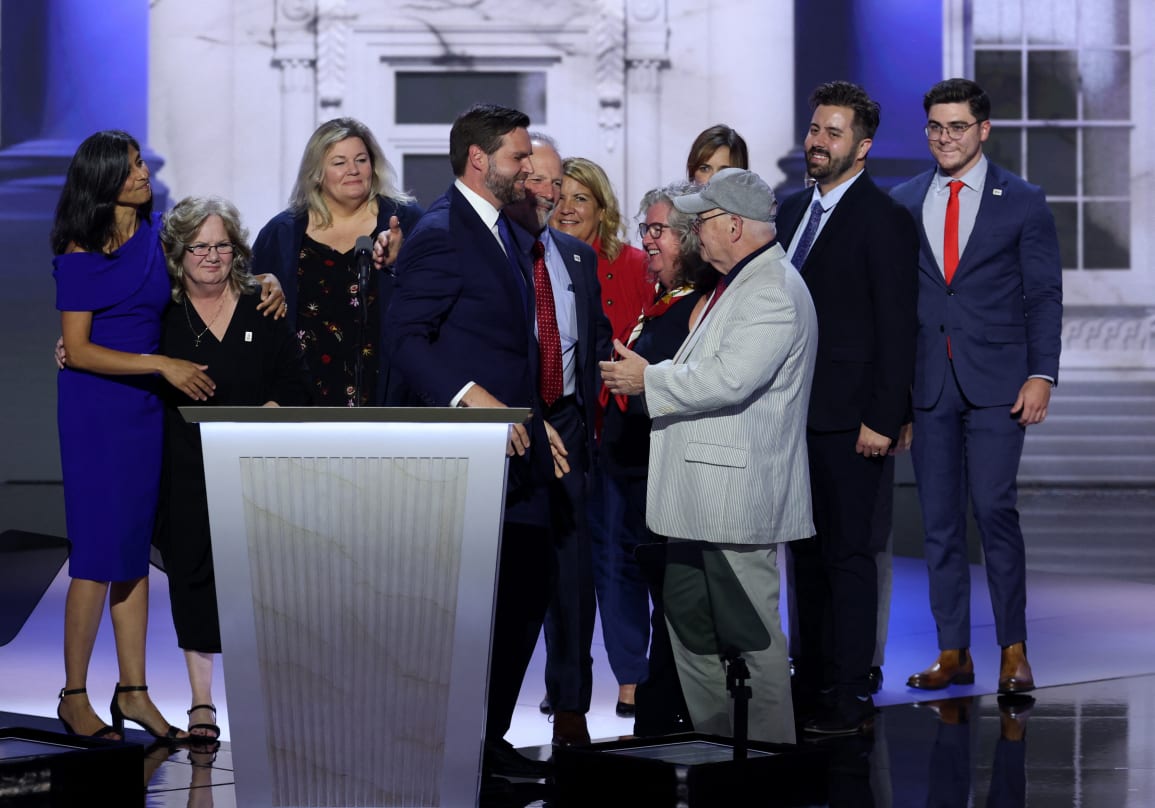
Vice presidential nominee Senator J.D. Vance (R-OH) is greeted by relatives
Vance brought his family on stage at the end of his RNC speech incluing (second left) his mother Beverley, who he said was now 10 years sober.
So I quit. I didn’t have a backup plan, and I was terrified. As fate would have it, a few months later I received an email from the Harvard math department, asking if any alumni were interested in teaching introductory calculus, and I deliberated for a full 10 seconds before responding yes. The next year a friend of mine mentioned a coding job at an education startup.
I’ve been at this job for over two years, doing interesting work that feels like it actually matters to someone. Next, I plan to go back to school for a Masters in education so I can someday teach. Learning–not money–changed the trajectory of my life. I want to help expose others to math or science or the arts. I want to be the Mr. Perkins in someone else’s story.
My mother shouldn’t have died at 46. She was sober for more than two years when she came down with her third round of double pneumonia in six months. Years of addiction had taken its toll on her body, and she just couldn’t keep going.
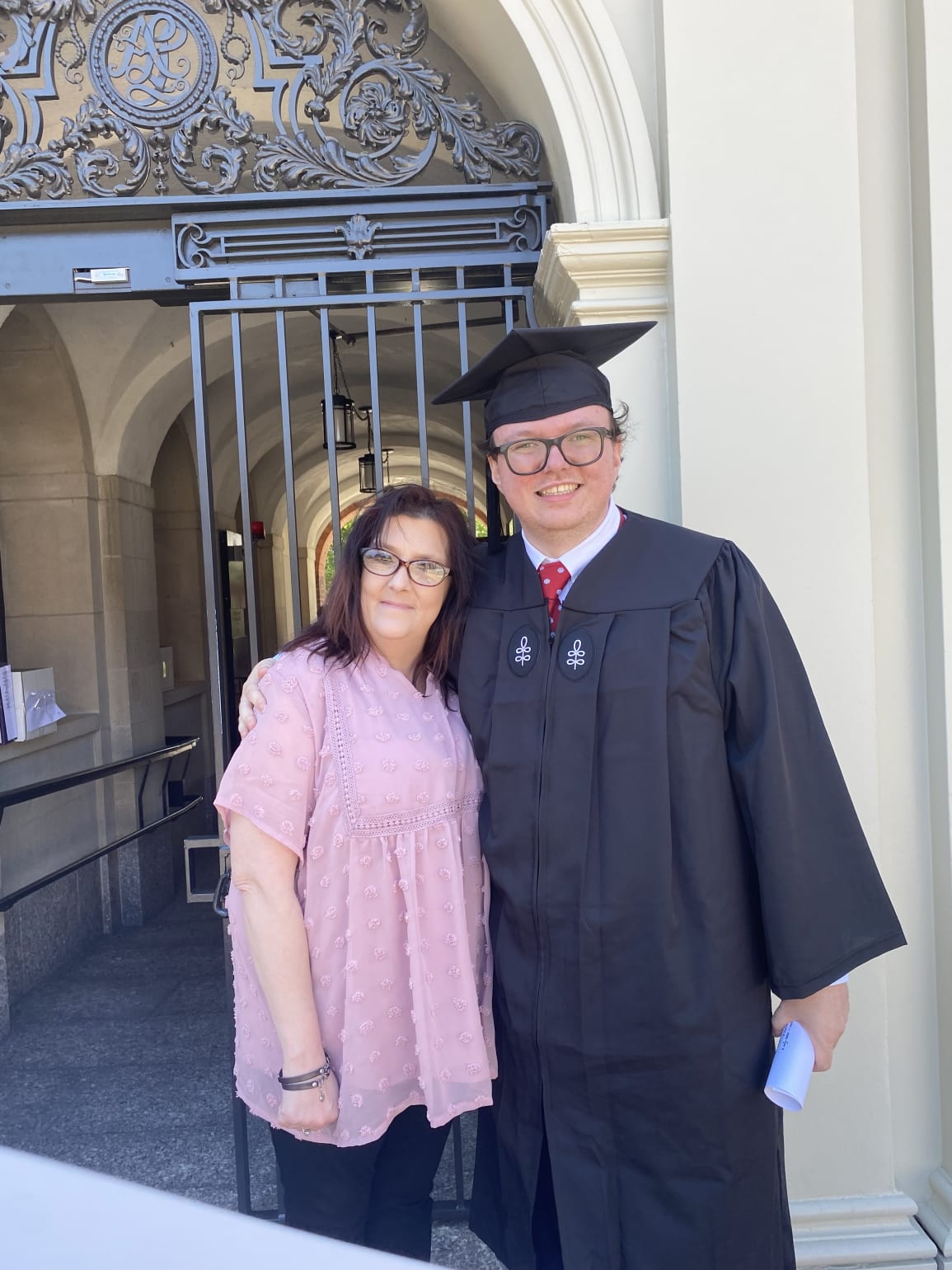
Caleb Miller and his mom, Melissa Brooks, before her passing.
Although she struggled, she was a great mom who loved her family with her whole heart and we loved her–and will forever miss her–just as fiercely. In Vance’s worldview, my mother died because she’s a bad person who made terrible choices. That’s another lie. My mother died because the American healthcare system is broken. She died because senators buckled to pharmaceutical lobbyists.
Now I’m worried about the rest of my family. If Republicans gain power, they want to eliminate Medicare, which would hurt my grandma, and eliminate Medicaid, which would destroy my dad. Project 2025 calls for abolishing the Department of Education and Vance himself has called for a national ban on abortion even in the case of rape and incest.
On a larger, global scale, I don’t get Vance’s love for Vladimir Putin’s Russia and support for the slaughter of innocent Ukrainians. I didn’t serve in the Marines like Vance–although I did play a lot of “Call of Duty” and I know enough that you might play a Russian shooting up an airport terminal in a video game, but in real life, they’re the bad guys.

J.D. Vance on stage, hand on heart, smiling
Vance outlined his life story at the RNC but it filled me with rage, writes Caleb Miller, for its stunningly wrong conclusions.
Vance embracing these policies is especially cruel for Ukrainians and people of Appalachia. Kentucky is the third most federally dependent state. West Virginia is fourth. Trump was born into a family with hundreds of millions but Vance should have empathy for his “fellow” hillbillies, for the culture he simultaneously claims and disavows. But this hillbilly origin story is just another tool for Vance to wave around when it’s convenient, and hide in the shed when it isn’t. JD Vance isn’t a hillbilly. To me, he’s a parasite, feasting off a culture that he really doesn’t understand.
When Vance accepted the nomination at the Republican National Convention on Wednesday night, he declared “Some people tell me I’ve lived the American Dream, and they are right.”
This is the core of why Vance fills me with rage. He wants you to believe that he pulled himself up by his bootstraps, and he wants you to look away as he pulls up the ladder behind him.
 (1)
(1) (1)
(1)